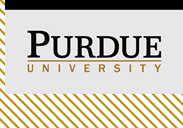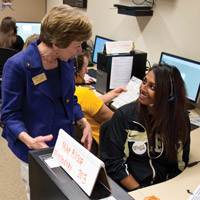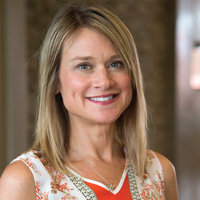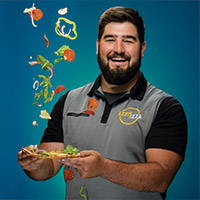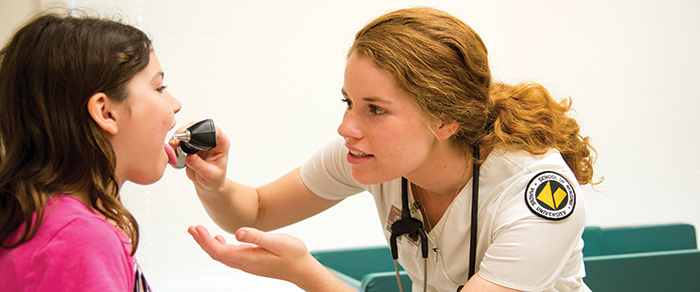
As part of her clinical experience during her senior year, nursing student Kelly Dyer provided primary care to children and adults under the supervision of preceptor Deb Mears, R.N. (Photo by Steven Yang)
Beyond the Classroom
Many HHS programs have hands-on learning built into the curriculum. A supervised field experience is required for all Consumer Science students and a similar 400-hour internship for Hospitality and Tourism Management majors. Clinical experiences or internships are embedded in such programs as Health and Kinesiology and Nursing.
Two new courses in Nutrition Science are providing a growing number of students interested in the field of sports nutrition the opportunity to work with Purdue student-athletes. Students are divided into four project groups: Fueling Station, Media, Team Nutrition, and Training Table.
Fueling stations are located in the training areas of Mollenkopf Athletic Center and Mackey Arena to supply custom shakes, foods and supplements to the athletes before, during and after workouts. Nutrition Science students staff the stations, helping to manage inventory and prepare the foods and supplements.
"I definitely learned the importance of thinking on my feet," says Elizabeth Piotrowicz, a senior with a dual major in dietetics and nutrition, fitness and health. She worked at the fueling station during her junior year and plans to pursue a career as a sports dietitian. "Schedules, tasks and needs can suddenly change, and I learned to quickly adjust and find a solution."
Students in the Media group reach out to more than 500 student-athletes daily with sports nutrition information. Students involved in Team Nutrition play a role in nutrition education, DEXA body composition analysis, and competition fueling requirements for each of Purdue's 18 varsity teams.
About 120 student-athletes eat dinner together five times a week at a small-scale dining facility on campus. Called the Training Table, it serves food that satisfies the athletes' extraordinary dietary needs. Nutrition Science students assigned to this group can try new recipes, formulate new menus, manage point-of-service food labeling and create nutrition education pieces.
Carmen Cucalon, a junior majoring in dietetics and nutrition, fitness and health, says it was her love of sports from a young age that influenced her decision to study nutrition. She wants to be a sports dietitian and jumped at the chance to begin gaining experience outside of the classroom.
"I heard about this course my freshman year and knew it would be a great opportunity," she says. "I've been able to interact with athletes, coaches and other professionals. This has allowed me to get an idea of how athletics works and the role of a sports dietitian."
Serving while learning
Many students opt to participate in a variety of experiences. Nursing student Kelly Dyer not only did her required clinical experience but also completed a research project and traveled to the Dominican Republic as part of a service-learning project to develop a water treatment system in a local community.
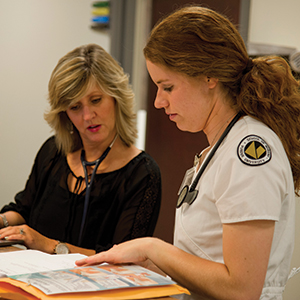
After seeing a pediatric patient at the Family Health Clinic of Carroll County, nursing student Kelly Dyer consults with Jennifer Coddington, clinical associate professor in the School of Nursing and certified pediatric nurse practitioner. (Photo by Steven Yang)
Dyer graduated in May 2014 after completing her clinical work at the Family Health Clinic of Carroll County, one of two clinics operated by the School of Nursing. The clinics provide primary health care in two medically underserved communities while providing an outlet for students to gain experience in direct patient care.
Before completing her senior capstone experience at the clinic, Dyer worked there on a quality improvement research project focused on self-management counseling, which refers to patients and providers working together to set personal health goals. For the research, she worked with Sara McComb, associate professor in the schools of Nursing and Industrial Engineering, and Jennifer Coddington, clinical associate professor in the School of Nursing and certified pediatric nurse practitioner at the clinic.
"Anyone with a chronic illness knows that taking care of their health primarily comes in the form of self-care and lifestyle habits, not office visits," Dyer says. "A lot of research is being done showing the impact of involving patients in their care and working with them to manage their own health."
Through interviews conducted with staff and her own observations, Dyer identified barriers to completing the self-management counseling. With the help of McComb and Coddington, she developed recommendations to improve the process and even conducted a training session for staff.
Dyer hopes to work in public health, especially with underserved populations around the world. This interest led to her two-year involvement in a service-learning project to bring clean water to a community in the Dominican Republic. She and three other nursing students teamed with students from Agricultural Economics, Food Science, Environmental and Ecological Engineering, and Civil Engineering to develop a water treatment system for a school in Las Canas. As nursing students, their role was to study the prevalence of waterborne illnesses and develop educational modules for the students on preventing germ transmission. They also created materials to train community health workers. After two years of planning, the team built the water treatment system this past summer.
"I have loved getting to learn about what other disciplines bring to the table and to see how nursing transcends hospitals and clinics," Dyer says. "We hope to take what we learn and build similar systems in other communities in the future."
Speech, Language, and Hearing Sciences offers a service-learning opportunity in Zambia. This is the second year a student team has traveled to that country to provide hearing and speech services to children and adults. Click here to read more about the students' trip.


